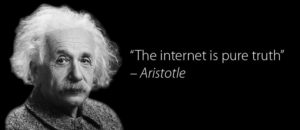How do you know what’s true?

In my last blog post, I asked how we can be educated about important issues and feel confident that we are getting fact-based information. I have several recommendations, none of which are my own unique ideas.
- Check your sources. Who is writing or speaking? Instead of reading someone’s interpretation of a new policy or a speech by a public official, try to find the actual documents. Read the speech or policy yourself. It takes more time to read original sources, but it will help you understand commentaries you may find online. It will also allow you to calibrate the commentators.
- If you read secondary sources, ask whether they have an agenda that they might be advocating. Anonymous posts are less likely to be objective. Ask yourself why someone might be afraid of putting their name on their views. Academics aren’t inherently objective, but are more likely to document statements they make, and provide back-up references that you can check out for yourself.
- Look for multiple but independent sources. If you read the same thing in multiple places, it might add credibility, but often people just repeat what they read somewhere else.
It is well known that confirmation bias affects most of us – this is a phenomenon in which we tend to believe information that confirms what we think we already know, and we discount information that conflicts with our existing perspectives. It takes awareness and effort to be open to the possibility that we might not know everything, that new information might mean we have to adjust our position on an issue. That’s important, because reaching consensus and healing some of the deep divisions that exist will require people to be humble and open to new ideas.
And remember: just because you saw it on the internet, doesn’t mean it’s true, and just because a conservative spokesperson said it, doesn’t necessarily mean it isn’t true.